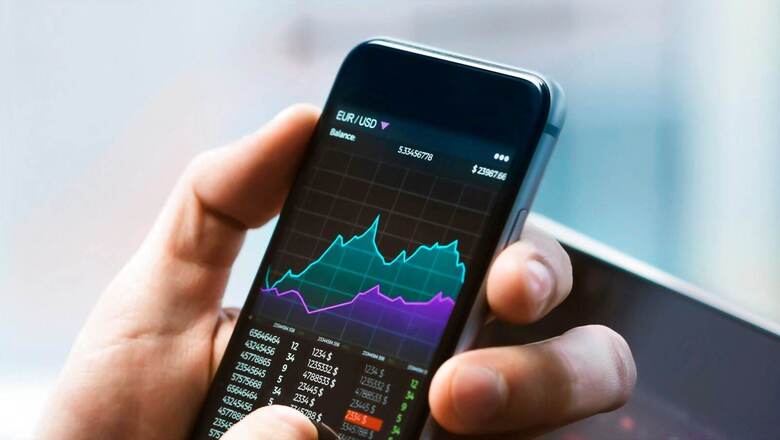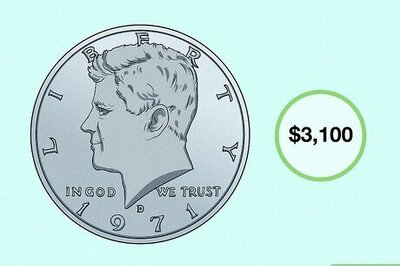
views
To tame the worst inflation in the United States in the last few decades, the Federal Reserve has decided to raise the interest rate on Wednesday. The American central bank increased the key short-term interest rate by 25 basis points or a quarter percentage point. This hike will bring the interest rate now into a range of 0.25 per cent to 5 per cent.
To support growth, the US Federal Reserve has kept the interest rate near zero since the beginning of the Covid-19 pandemic two years back. Meanwhile, inflation in the United States skyrocketed to a four-decade high. The retail inflation touched 7.9 per cent in February, first time since 1982. The deadly waves of coronavirus pandemic disrupted the supply chains and pushed the prices of natural gas and other essential commodities. Moreover, Russian invasion of Ukraine recently shot up the crude oil prices to $140 per barrel, highest in 14 years. Amid the geo-political uncertainity, Federal Reserve decided to hike rates to raise borrowing costs enough to slow growth and tame high inflation.
US Fed Rate Hike: Why is it Increasing Interest Rates?
“Inflation remains elevated, reflecting supply and demand imbalances related to the pandemic, higher energy prices, and broader price pressures. The invasion of Ukraine by Russia is causing tremendous human and economic hardship. The implications for the U.S. economy are highly uncertain, but in the near term the invasion and related events are likely to create additional upward pressure on inflation and weigh on economic activity.
Explaining the rational behind the rate hike, the policymaking Federal Open Market Committee said in a statement, “Inflation remains elevated, reflecting supply and demand imbalances related to the pandemic, higher energy prices, and broader price pressures. The invasion of Ukraine by Russia is causing tremendous human and economic hardship. The implications for the US economy are highly uncertain, but in the near term the invasion and related events are likely to create additional upward pressure on inflation and weigh on economic activity.”
Fed official also projected six more hikes to raise its short-term rate to 1.875 per cent at the end of 2022. It could increase rates by a half-point at future meetings.
US Fed Rate Hike: Impact on Indian Investors
A hike in interest rates in the United States has an impact on the debt and equity markets all over the world. After Fed’s signalling, stock prices have gone up — S&P 500 surged to close 2.2 per cent higher for the day. The Dow Jones followed a similar pattern and ended 1.6 per cent higher. The NASDAQ also jumped to close 3.7 per cent higher that the start of the day.
Sensex and Nifty — domestic indices also started Thursday on a positive note. Sensex jumped 1,000 points while Nifty crossed 17,200 on March 17. As investors were expecting a rate hike, the decision of the US central bank did not come as a surprise. “The explanation is that the market was oversold and the consequent short covering pushed indices higher. The market drew confidence from the Fed chief Powel’s statement that the American economy is very strong and well positioned to handle tighter monetary policy,” said V K Vijayakumar, chief investment strategist at Geojit Financial Services.
“Short-covering in India, too, will lift markets today. FPIs turning buyers after a long time and softness in crude will support the market. There is upward potential in financials, particularly in high quality private banks in which FPIs were sustained sellers,” he added.
RBI to Change its Policy Stance?
This may also prompt the Reserve Bank of India (RBI) to reassess its policystance during the next meeting, believed analysts. “The rate hike by Fed was on the expected lines due to high inflation risk coupled with geopolitical tensions. The US treasury yields had shown an immediate spike after the FOMC announcement but stabilized thereafter. The current rate hike along with anticipated monetary tightening indicates the Fed’s stance of controlling the high inflation prevalent in the US. Asian markets have reacted positively on account of Russia-Ukraine situation entering the resolution phase which was further supported by stabilisation of crude prices. Taking this into account, the RBI may reassess its accommodative stance in the next month’s policy meeting,” said Shivam Bajaj, founder and CEO at Avener Capital.
Read all the Latest Business News and Breaking News here

















Comments
0 comment